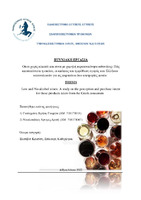| dc.contributor.advisor | Κουσίση, Ελισάβετ | |
| dc.contributor.author | Νικολουδάκη, Άρτεμις Αρετή | |
| dc.contributor.author | Γκαλημάνη, Ειρήνη Γεωργία | |
| dc.date.accessioned | 2022-03-31T12:52:55Z | |
| dc.date.available | 2022-03-31T12:52:55Z | |
| dc.date.issued | 2022-03-09 | |
| dc.identifier.uri | https://polynoe.lib.uniwa.gr/xmlui/handle/11400/2039 | |
| dc.identifier.uri | http://dx.doi.org/10.26265/polynoe-1890 | |
| dc.description.abstract | Το αυξανόμενο ενδιαφέρον σε ποτά με χαμηλή και μηδενική περιεκτικότητα σε αιθανόλη αποτελεί μια παγκόσμια τάση η οποία έχει επηρεάσει και την κατηγορία του οίνου. Στην παραπάνω βάση, σκοπός της συγκεκριμένης εργασίας ήταν να δοθούν λεπτομέρειες για αυτές τις νέες κατηγορίες οίνων αλλά και να μελετηθούν, αποτυπωθούν και να γίνουν αντιληπτές οι προτιμήσεις και η στάση των Ελλήνων καταναλωτών απέναντι σε αυτά τα προϊόντα.
Για το σκοπό αυτό, οργανώθηκε και διεξάχθηκε μία διαδικτυακή έρευνα αγοράς στα πλαίσια της παρούσας πτυχιακής εργασίας, η οποία διήρκησε από το Φεβρουάριο έως τον Απρίλιο του 2021. Το ερωτηματολόγιο που δημιουργήθηκε, απαντήθηκε από δείγμα συνολικά 741 Ελλήνων καταναλωτών, άνω των 18 ετών. Οι ερωτήσεις που περιλάμβανε ήταν όλες «κλειστού τύπου» για να μπορέσει ακολούθως να γίνει εύκολη στατιστική επεξεργασία των απαντήσεων και να προκύψει μια σειρά συμπερασμάτων.
Από την έρευνα προέκυψε καταρχήν ότι το ποσοστό των καταναλωτών που έχουν δοκιμάσει αυτού του τύπου τα οινικά προϊόντα είναι αρκετά χαμηλό: 30% των καταναλωτών δήλωσε ότι έχει δοκιμάσει οίνους με μειωμένη και μόλις το 16% οίνους με μηδενική περιεκτικότητα σε αλκοόλ. Από αυτούς που είχαν δοκιμάσει τις παραπάνω κατηγορίες ποτών και κλήθηκαν να εκφράσουν την αρέσκειά τους σε αυτά, καταρχήν προέκυψε στατιστική διαφοροποίηση στην αρέσκεια αυτών και για τις δυο κατηγορίες. Γενικά το καταναλωτικό κοινό φάνηκε αρκετά διστακτικό και διατήρησε ουδέτερη στάση τόσο απέναντι στους οίνους με μειωμένη όσο και απέναντι σε αυτούς με μηδενική περιεκτικότητα σε αλκοόλ. Παρόλα αυτά, δεν ήταν μικρό το μερίδιο των Ελλήνων καταναλωτών που βρέθηκαν θετικά προκείμενοι απέναντι στις συγκεκριμένες κατηγορίες οίνων και θα ήταν πιθανό να τις εντάξει στην καθημερινότητά του. Το επίπεδο αρέσκειας και αποδοχής των παραπάνω προϊόντων, επηρεάστηκε από ποικίλα κριτήρια που αναφέρονται διεξοδικά στην εργασία και αφορούν τόσο δημογραφικά στοιχεία όσο και το επίπεδο οινικής ενημέρωσης των ερωτηθέντων. Η έρευνα κλείνει με προτάσεις που έχουν ως στόχο την καλύτερη προώθηση και τελικά την αύξηση των πωλήσεων και του ανταγωνιστικού πλεονεκτήματος στην αγορά των συγκεκριμένων προϊόντων συγκριτικά με τους συμβατικούς οίνους. | el |
| dc.format.extent | 160 | el |
| dc.language.iso | el | el |
| dc.publisher | Πανεπιστήμιο Δυτικής Αττικής | el |
| dc.rights | Αναφορά Δημιουργού - Μη Εμπορική Χρήση - Παρόμοια Διανομή 4.0 Διεθνές | * |
| dc.rights | Attribution-NonCommercial-NoDerivatives 4.0 Διεθνές | * |
| dc.rights.uri | http://creativecommons.org/licenses/by-nc-nd/4.0/ | * |
| dc.subject | Οίνοι χωρίς αλκοόλ | el |
| dc.subject | Οίνοι μειωμένης αιθανόλης | el |
| dc.subject | Έρευνα αγοράς | el |
| dc.subject | Alcohol free wines | el |
| dc.subject | Low alcohol wines | el |
| dc.title | Οίνοι χωρίς αλκοόλ και οίνοι με χαμηλή περιεκτικότητα αιθανόλης: πώς αποτυπώνεται η εικόνα, οι απόψεις και η πρόθεση αγοράς των Ελλήνων καταναλωτών για τις παραπάνω δύο κατηγορίες ποτών | el |
| dc.title.alternative | Low and no-alcohol wines: a study on the perception and purchase intent for those products taken from the Greek consumers | el |
| dc.type | Πτυχιακή εργασία | el |
| dc.contributor.committee | Δημοπούλου, Μαρία | |
| dc.contributor.committee | Ζάβαλη, Μαρία | |
| dc.contributor.faculty | Σχολή Επιστημών Τροφίμων | el |
| dc.contributor.department | Τμήμα Επιστημών Οίνου, Αμπέλου και Ποτών | el |
| dc.description.abstracttranslated | The growing interest in drinks with low- and no-alcohol content is a global trend that has also affected the wine category. The aim of this thesis was to explore the categories of wines with no and low ethanol with respect to their history and methods of production but mainly to carry out an online consumer study, in order to capture and understand the preferences and attitudes of Greek consumers towards these products.
To this end, an online consumer study was organised and conducted, lasting from February to April 2021. The questionnaire included “closed” type of questions only, focused on the wine consumption habits and experiences as well as the knowledge and preference of the consumers related to the wines with low and no alcohol. A sample of 741 Greek consumers, over the legal drinking age of 18 years old, took part in the study.
The outcome of the study revealed that few consumers in Greece have actually tried those products with 30% of them declaring that they have tasted a reduced alcohol wine and an even lower 16% of them declaring they had tasted a non-alcoholic one. Using a nine-point hedonic scale, we measured the appreciation of consumers that had actually tasted products in both categories, and there was a significant difference in their preference for each category respectively. All in all, consumers showed some reluctance and generally maintained a rather neutral attitude towards both low- and no-alcohol wines. Nevertheless, there was a considerable percent of Greek consumers who demonstrated both positive attitudes towards those categories and the willingness to include them in their daily lifestyle. This level of satisfaction and ultimately acceptance was influenced by a variety of criteria both demographic ones, as well as related to their wine knowledge. In the end, the thesis concludes with proposals aimed at promotion strategies that could increase the competitive advantage of those products compared to the conventional wines and ultimately their sales. | el |



